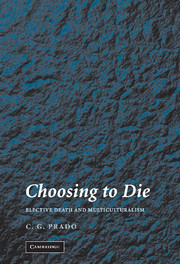Book contents
- Frontmatter
- Contents
- Preface
- 1 Setting the Stage
- 2 Criteria for Rational Suicide
- 3 Clarifying and Revising the Criteria
- 4 Application Issues
- 5 What Standards?
- 6 Relativism and Cross-Cultural Assessment
- 7 The Role of Religion
- 8 Assessment Latitude
- 9 The Realities of Cross-Cultural Assessment
- Works Cited
- Index
2 - Criteria for Rational Suicide
Published online by Cambridge University Press: 05 June 2012
- Frontmatter
- Contents
- Preface
- 1 Setting the Stage
- 2 Criteria for Rational Suicide
- 3 Clarifying and Revising the Criteria
- 4 Application Issues
- 5 What Standards?
- 6 Relativism and Cross-Cultural Assessment
- 7 The Role of Religion
- 8 Assessment Latitude
- 9 The Realities of Cross-Cultural Assessment
- Works Cited
- Index
Summary
Lack of examples is the bane of philosophical writing. Much too often abstract points are made without practical instances to ground them in experience. At the same time, examples should not be so specific as to draw attention away from the general point being made, and, as alluded to previously, there are times when examples, even if actual events, should not be used to attempt to derive general guiding principles. This is the bane of clinical writing. Too often reliance on case studies results in generalized conclusions and recommendations that are either nearly vacuous or too specific to be broadly applicable. To try to prevent both of these problems while still providing a useful reference point for the discussion that follows, I offer the entirely hypothetical case of Ms. A.
Ms. A is sixty-five years old. For the last year or two she has been thinking hard about what life likely holds for her. The main consideration is that both her mother and her father had severe Alzheimer's disease in their early and mid-seventies. Ms. A has given serious thought to ending her life prior to succumbing to the disease. She has taken certain steps: prepared a will, organized her papers, and liquidated her assets. Her children are grown and on their own, and her husband was killed two years earlier in an accident. There are, then, no immediate familial obligations that preclude suicide.
- Type
- Chapter
- Information
- Choosing to DieElective Death and Multiculturalism, pp. 26 - 46Publisher: Cambridge University PressPrint publication year: 2008



